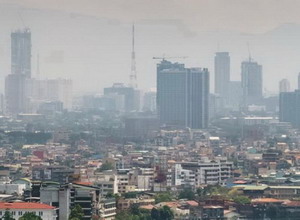 19 December 2018 – Air pollution, both indoor and outdoor, is a major contributor to the environmental burden of disease in Pakistan. Environmental risks arise from both indoor air pollution, much of it caused by the domestic use of solid fuels, and outdoor air pollution. Together they facilitate and exacerbate lower respiratory infections, cardiovascular and respiratory diseases, and lung cancer. Studies undertaken by the Pakistan Environmental Protection Agency (EPA) indicate that air quality in most cities does not meet WHO Air Quality Standards (20 µg/m³ for the annual mean particulate matter with diameter of 10µ m3 or less - PM10).
19 December 2018 – Air pollution, both indoor and outdoor, is a major contributor to the environmental burden of disease in Pakistan. Environmental risks arise from both indoor air pollution, much of it caused by the domestic use of solid fuels, and outdoor air pollution. Together they facilitate and exacerbate lower respiratory infections, cardiovascular and respiratory diseases, and lung cancer. Studies undertaken by the Pakistan Environmental Protection Agency (EPA) indicate that air quality in most cities does not meet WHO Air Quality Standards (20 µg/m³ for the annual mean particulate matter with diameter of 10µ m3 or less - PM10).
No regular monitoring system exists for air quality and pollution. Federal and provincial environmental protection agencies have fixed and mobile air quality monitoring stations but data collection is limited.
Punjab province suffers from extreme smog, particularly in the area surrounding Lahore, and observations over the last 3 years have shown it is at its worst between November and January.
The Secretary of the Punjab Environmental Protection Department (EPD) requested WHO support in assessing the health effects of air pollution and the monitoring of air quality by Punjab EPD staff and help organizing stakeholder discussions to generate recommendations for the monitoring of air quality and ways to mitigate its health impacts.
A WHO technical support and capacity building mission visited Pakistan, and a workshop was held to train EPA staff on using the WHO software AirQ+. Following the 3 days of training a stakeholder meeting was held to identify ways to reduce the problems caused by smog.
The majority of the almost 40 participants taking part in the training workshop came from the Punjab EPD, with one participant from the Punjab Health Policy Unit.
The workshop was facilitated by WHO Regional Advisor Mr Mazen Malkawi and WHO consultant Mr Michal Krzyzanowski and supported by Dr Nusrat from EPA.
Additional technical contributions on ambient air quality were provided by EHP head Dr Zafar Fatmi. One session was given by a chest specialist from Punjab’s Gulab Devi hospital; another covered the Punjab EPD’s current monitoring of air quality in detail, and a dashboard of hospital-based data reflecting the preliminary diagnosis of 82 diseases was shared.









